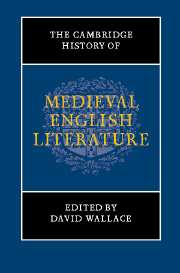Book contents
- Frontmatter
- I AFTER THE NORMAN CONQUEST
- II WRITING IN THE BRITISH ISLES
- III INSTITUTIONAL PRODUCTION
- Introduction
- 12 Monastic productions
- 13 The friars and medieval English literature
- 14 Classroom and confession
- 15 Medieval literature and law
- 16 Vox populi and the literature of 1381
- 17 Englishing the Bible, 1066–1549
- IV AFTER THE BLACK DEATH
- V BEFORE THE REFORMATION
- Chronological outline of historical events and texts in Britain, 1050–1550
- Bibliography
- Index of manuscripts
- Index
- References
15 - Medieval literature and law
from III - INSTITUTIONAL PRODUCTION
Published online by Cambridge University Press: 28 March 2008
- Frontmatter
- I AFTER THE NORMAN CONQUEST
- II WRITING IN THE BRITISH ISLES
- III INSTITUTIONAL PRODUCTION
- Introduction
- 12 Monastic productions
- 13 The friars and medieval English literature
- 14 Classroom and confession
- 15 Medieval literature and law
- 16 Vox populi and the literature of 1381
- 17 Englishing the Bible, 1066–1549
- IV AFTER THE BLACK DEATH
- V BEFORE THE REFORMATION
- Chronological outline of historical events and texts in Britain, 1050–1550
- Bibliography
- Index of manuscripts
- Index
- References
Summary
In addition to serious and personal matters that lie beyond the scope of this essay (such as accusations of rape directed at Chaucer and Malory), scholars who investigate the interrelationship of literature and law are generally interested in one of two main topics: the formal question of legal writing as a species of literature, or the thematic question of the law as it has been represented in literature. The first approach is often restricted to a somewhat belle-lettristic discussion of the work of noted legal stylists such as Oliver Wendell Holmes, but it can extend to a more subtle analysis of legal forms: the adversarial trial as agonistic drama, for instance, or the witness’s deposition as narrative. At its most extreme, as in Stanley Fish’s impudent interrogation of the text of the American constitution, it is likely to appear irrelevant, if not downright offensive, to many practising lawyers. The second, and commoner, approach is generally less controversial. Many authors have been interested in legal matters and many literary works present fictional trials or lawsuits, so that a minor critical genre has grown up analysing the trials of Shylock or Billy Budd or the progress of Jarndyce vs. Jarndyce or the proceedings against Josef K, in terms of either legal history or general jurisprudential principles. There remains, however, a third area of investigation: regarding the law and literature as parallel forms of discourse, each with its own conventions and traditions, the scholar asks how the lawyer’s comparatively more formal analysis of mental or social processes can help us understand what the imaginative writer sometimes leaves unspoken or expresses only obliquely.
- Type
- Chapter
- Information
- The Cambridge History of Medieval English Literature , pp. 407 - 431Publisher: Cambridge University PressPrint publication year: 1999
References
- 7
- Cited by

